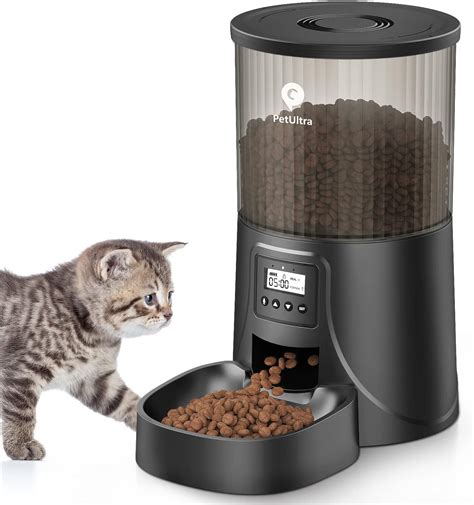Benefits of Automatic Cat Feeders for Seniors
For seniors, the well-being of their beloved feline companions is paramount. However, the challenges of aging can make it difficult to consistently provide timely meals. Automatic cat feeders offer a solution to this problem, bringing numerous benefits to elderly pet owners.

1. Guaranteed Regular Feedings
Automatic feeders eliminate the risk of forgetting to feed the cat, ensuring consistent and timely meals at scheduled intervals. This regular feeding routine is crucial for maintaining a cat’s health and preventing digestive issues.
2. Portion Control and Diet Management
These devices allow for precise portion control, preventing overfeeding and obesity. Additionally, they can be programmed to dispense different types of food, catering to cats with specific dietary needs or preferences.
3. Convenience and Peace of Mind
For seniors with mobility issues or memory challenges, automatic feeders reduce the burden of daily feeding. They provide peace of mind by ensuring the cat is always well-fed, even when the owner is away or unable to assist.
4. Enhanced Sleep Quality
Seniors with sleep disturbances may benefit from timed feeders that dispense food at night. This can help regulate the cat’s sleep-wake cycle and minimize nighttime disturbances for both the owner and the pet.
5. Reduced Stress Levels
The absence of feeding-related anxiety can reduce stress levels for both the cat and the owner. Automatic feeders provide consistency and predictability, creating a more tranquil environment for everyone involved.
6. Improved Mobility
For seniors with mobility impairments, automatic feeders allow them to care for their cats without having to bend or reach down to fill food bowls. This can improve their quality of life and maintain their independence.
Automatic Cat Feeders vs. Manual Feeding
| Feature | Automatic Cat Feeders | Manual Feeding |
|---|---|---|
| Feeding Frequency | Consistent, timed | Relies on human memory |
| Portion Control | Precise, customizable | Difficult to control |
| Convenience | Minimal effort required | Daily feeding required |
| Peace of Mind | Ensures timely meals | Potential for forgetting or inconsistency |
| Mobility Considerations | Suitable for seniors with impairments | May require bending or reaching |
Choosing the Right Automatic Cat Feeder
Seniors should consider the following factors when selecting an automatic cat feeder:
- Feeding Capacity: Large enough to hold sufficient food for extended periods.
- Programmability: Easy to set and adjust feeding schedules.
- Power Source: Battery-operated or electrical.
- Food Type: Compatible with the cat’s preferred food.
- Ease of Cleaning: Easy to disassemble and clean to prevent bacterial buildup.
Common Mistakes to Avoid
- Overfilling the Hopper: Follow manufacturer’s guidelines to avoid food spoilage.
- Not Cleaning Regularly: Clean the feeder according to the manufacturer’s instructions to maintain hygiene.
- Ignoring the Battery Indicator: Replace batteries promptly to avoid power outages.
- Placing the Feeder Too Close to the Cat’s Sleeping Area: Allow the cat to approach the feeder without disturbance.
FAQs
Q1: Are automatic cat feeders suitable for all cats?
A: Yes, automatic cat feeders are suitable for most cats, but some may require adaptation or training.
Q2: How long can food be stored in an automatic cat feeder?
A: Typically, food can be stored in the feeder for 2-4 weeks, depending on the type of food and the feeder’s design.
Q3: What type of power source is best for an automatic cat feeder?
A: Battery-operated feeders offer portability, while electrical feeders provide consistent power and longer battery life.
Q4: How often should an automatic cat feeder be cleaned?
A: Clean the feeder regularly, at least once a week, to prevent bacterial buildup.
Q5: Can I use an automatic cat feeder for wet food?
A: Most automatic cat feeders are designed for dry food, but some models may be compatible with wet food.
Q6: What are some additional benefits of automatic cat feeders?
A: Automatic cat feeders can help prevent overfeeding, reduce waste, and provide a sense of routine for the cat.
Current Status and Future Outlook
Automatic cat feeders have become increasingly popular, with a growing market driven by the aging population and the increasing number of pets. The demand for advanced features, such as remote monitoring and integration with smart home systems, is expected to drive future innovation in this industry.
New Applications of Automatic Cat Feeders
- Pet Cafes: Automatic feeders can ensure a consistent feeding schedule in busy pet cafes, improving the well-being of cats.
- Animal Shelters: Automatic feeders can automate feeding in animal shelters, reducing the workload for staff and providing a more regular diet for animals.
- Veterinary Clinics: Automatic feeders can provide precise feeding during veterinary stays, ensuring optimal nutrition and recovery for animals.





















